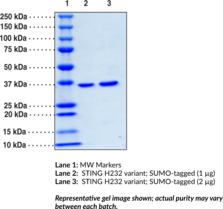Territorial Availability: Available through Bertin Technologies only in France
- Correlated keywords
- innate immune responses stimulators of Genes cyclic dinucleotide c-di-GMP cyclic-di-GMP c-di-AMP cyclic-di-AMP c-GMP-AMP cyclic-GMP-AMP Type I 1 one interferon IFN NF-kappa B NF-?B NF-kB Goldenticket Listeria DMXAA bacterial second messengers immunomodulatory genes autoimmune disorders flavonoids 5,6-dimethylxanthenone-4-acetic acid SDS-PAGE endoplasmic reticulum interferon stimulated mediator of IRF3 activation transmembrane protein 173
- Product Overview:
STING H232 variant; SUMO-tagged contains amino acids 155-341 of the H232 variant and a removable N-terminal SUMOpro tag. Stimulator of interferon genes (STING) is a component of the innate immune response that binds to cyclic dinucleotides, which are bacterial second messengers, leading to activation of NF-?B and transcription of immunomodulatory genes, including type I interferon (IFN).{22400,22401,24611,24607} The H232 variant of STING is found at a 13.7% frequency in the 1000 Genome Project.{38697} The SNP variant R232 (Item No. 22816) is the most common variant in the human population, found at a frequency of 57.9%. Small ubiquitin-like modifier (SUMO) proteins modify proteins post-translationally, leading to a variety of functional effects.{38902} In unstimulated cells in vitro, sumoylation stabilizes STING, inhibits its degradation, and facilitates oligomerization, leading to increased recruitment and activation of IRF3. In the early phase of herpes simplex virus type 1 (HSV-1) infection in vitro, dimerized STING is sumoylated by Trim38 and then desumoylated by Senp2 and degraded during the late phase of infection.
Cayman Chemical’s mission is to help make research possible by supplying scientists worldwide with the basic research tools necessary for advancing human and animal health. Our utmost commitment to healthcare researchers is to offer the highest quality products with an affordable pricing policy.
Our scientists are experts in the synthesis, purification, and characterization of biochemicals ranging from small drug-like heterocycles to complex biolipids, fatty acids, and many others. We are also highly skilled in all aspects of assay and antibody development, protein expression, crystallization, and structure determination.
Over the past thirty years, Cayman developed a deep knowledge base in lipid biochemistry, including research involving the arachidonic acid cascade, inositol phosphates, and cannabinoids. This knowledge enabled the production of reagents of exceptional quality for cancer, oxidative injury, epigenetics, neuroscience, inflammation, metabolism, and many additional lines of research.
Our organic and analytical chemists specialize in the rapid development of manufacturing processes and analytical methods to carry out clinical and commercial GMP-API production. Pre-clinical drug discovery efforts are currently underway in the areas of bone restoration and repair, muscular dystrophy, oncology, and inflammation. A separate group of Ph.D.-level scientists are dedicated to offering Hit-to-Lead Discovery and Profiling Services for epigenetic targets. Our knowledgeable chemists can be contracted to perform complete sample analysis for analytes measured by the majority of our assays. We also offer a wide range of analytical services using LC-MS/MS, HPLC, GC, and many other techniques.
Accreditations
ISO/IEC 17025:2005
ISO Guide 34:2009
Cayman is a leader in the field of emerging drugs of abuse, providing high-purity Schedule I-V Controlled Substances to federally-licensed laboratories and qualified academic research institutions for forensic analyses. We are certified by ACLASS Accreditation Services with dual accreditation to ISO/IEC 17025:2005 and ISO Guide 34:2009.





